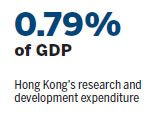Universities urged to improve rankings
Updated: 2015-10-10 08:39
By Shadow Li in Hong Kong(HK Edition)
|
|||||||||
Indifference to the world's fastest-developing research and development sector on the Chinese mainland will cost Hong Kong universities decades of global prestige in as little as five years, head of Department of Education Policy and Leadership of Hong Kong Institute of Education Ng Shun-wing has warned.
In the past weeks, several globally renowned university rankings have put the city's leading higher education institution, the University of Hong Kong, behind its major competitor on the mainland, Peking University.
In the annual reputation ranking for universities by London-based magazine Times Higher Education, also known as THE, five out of the six local universities listed on this year's rankings have dropped despite slightly elevated scores.
The editor of the rankings, Phil Baty, pointed out that Hong Kong should not take its decades of prestige for granted when facing booming institutions with abundant finance ammunition and strong government support in East Asia.
A University Grants Committee (UGC) report in 2010 foresaw the problems. It predicted that despite some universities in the city retaining a high reputation globally, quality would deteriorate as each university's policies to internationalize themselves were not holistic.
Ng pointed out that the failure to retain their international status for universities in the city lay in the limited financial support for research work.
It is no secret that Hong Kong has lagged behind its competitors in the amount of money being put into research.
According to Legislative Council papers, Hong Kong's research and development expenditure has increased slightly from 0.55 percent to 0.79 percent of the city's GDP over the last 10 years. This is far behind the 4.15 percent in South Korea and 3.49 percent in Japan in 2013.
Education policy researcher from the Chinese University of Hong Kong Lai Man-hong expressed disappointment over Hong Kong's low input in research and development. Such a developed and wealthy city should invest more, he said.
Several local universities' vice-chancellors have made repeated warnings over the lack of vision for research and development at higher institutions.
Currently, research funds in Hong Kong and the mainland are bound by barriers, with both places funding their own local scholars. As a solution to the drying up of cash flow in research and development, the UGC's 2010 report suggested breaking the barriers to allow a two-way flow of research funds between the mainland and Hong Kong.
"Although the Hong Kong government has vast financial surpluses, its traditional laissez-faire orientation keeps its universities from being internationally competitive in research funding. But the 2 percent of GDP spent by the mainland on research and development can help Hong Kong research in science and technology," said Gerard Postiglione, director of the University of Hong Kong's Wah Ching Centre of Research on Education in China.
According to UGC statistics, the city's non-local proportion of research and development expenditure maintains at 2 percent of the total expenditure from 2009 to 2012.
Currently, there seemed to be thriving collaboration between Hong Kong universities and their mainland counterparts as they rushed to set up sister universities or branches on the mainland. But Ng said these collaborations were just scratching the surface.
Setting up cross-border research funds for scholars from both the city and the mainland would create more in-depth and mutually beneficial cooperation, he said.
The veteran scholar believed that Hong Kong should seize the opportunity to strive for more collaboration in research and development in the nation's coming 13th Five-Year Plan (2016-20).

(HK Edition 10/10/2015 page6)